“Alfred Wetzler was a true hero. His escape from Auschwitz, and the report he helped compile with Rudolf Vrba, telling for the first time the truth about the camp as a place of mass murder, led directly to saving the lives of thousands of Jews – the Jews of Budapest who were about to be deported to their deaths. No other single act in the Second World War saved so many Jews from the fate that Hitler had determined for them.”
~Sir Martin Gilbert

1865– The Mount Tambora volcano in the northern part of Sumbawa (Indonesia) began a three-month-long eruption.
With a Volcanic Explosivity Index of 7, the eruption was the most devastating in recorded history.
The explosion was heard on Sumatra Island, more than 1,200 miles away. The eruption ultimately killed 71,000 people and affected Earth’s climate for the next two years.
Before the volcano, it was more than 14,100 feet high, making it then one of the tallest peaks in the Indonesian archipelago.
After the eruption, its height had been reduced to 9,350 feet.
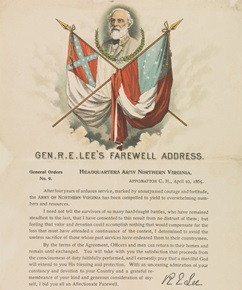
1865– One day after surrendering his army to Ulysses S. Grant at Appomattox Court House, Confederate General Robert E. Lee issued his farewell address to his troops. This is a bit lengthy but what became known as General Order No. 9 demonstrated the affection Lee had for his defeated army.
After four years of arduous service marked by unsurpassed courage and fortitude, the Army of Northern Virginia has been compelled to yield to overwhelming numbers and resources.
I need not tell the survivors of so many hard fought battles, who have remained steadfast to the last, that I have consented to the result from no distrust of them.
But feeling that valor and devotion could accomplish nothing that could compensate for the loss that must have attended the continuance of the contest, I have determined to avoid the useless sacrifice of those whose past services have endeared them to their countrymen.
By the terms of the agreement, officers and men can return to their homes and remain until exchanged. You will take with you the satisfaction that proceeds from the consciousness of duty faithfully performed, and I earnestly pray that a merciful God will extend to you his blessing and protection.
With an unceasing admiration of your constancy and devotion to your Country, and a grateful remembrance of your kind and generous consideration for myself, I bid you an affectionate farewell.
— R. E. Lee, General
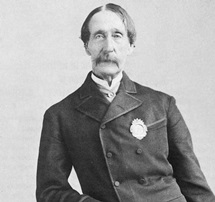
1866– The American Society for the Prevention of Cruelty to Animals (ASPCA), dedicated to preventing animal cruelty, was founded by Henry Bergh.
The organization was created on the belief that animals were entitled to kind and respectful treatment at the hands of humans, and must be protected under the law. It is the oldest animal welfare organization in the United States.
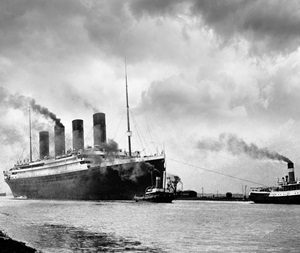
1912– The “unsinkable” RMS Titanic – with an estimated 2,225 passengers and crew aboard – set sail from Southampton, England on her maiden – and only voyage.
The story continues on April 15…
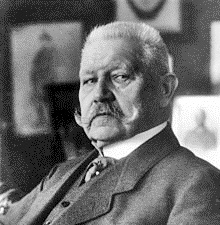
1932– Incumbent President, Paul von Hindenburg was re-elected to a second seven-year term as president of Germany. His major opponent in the election was Adolf Hitler of the Nazi Party.
Hindenburg, who deeply distrusted and personally detested Hitler, had been motivated to run for re-election primarily by a desire to stop Hitler from winning the presidency. Nevertheless, following his re-election, Hindenburg failed to prevent the Nazis from assuming power.
Two successive federal elections left the Nazis as the largest party in the Reichstag and Hindenburg reluctantly appointed Hitler as Chancellor of Germany in January 1933.
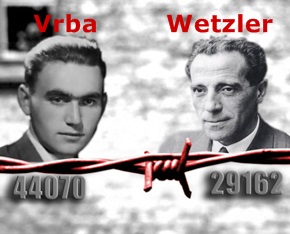
1944– Rudolf Vrba (tattoo 44070) and Alfred Wetzler (tattoo 29162) escaped from the Auschwitz II-Birkenau death camp. That may seem courageous but not altogether significant until you learn what the two men did when they arrived in Slovakia two weeks later.
They wrote a detailed 32-page report about the mass murder that was taking place at the camp. The Vrba-Wetzler Report confirmed material in earlier reports from Polish and other escapees, but their story was unique in its “unflinching detail”.
The Allies had been told on November 12, 1942 that Jews were being killed en masse in Auschwitz. The Polish government-in-exile forwarded intelligence about what was happening inside the camp, and the New York Times published a report to that effect two weeks later.
However, it remained an “inside story” as a result of anti-Semitism and the British Foreign Office’s refusal to confirm the reports as genuine.
The Vrba-Wetzler report changed all of that. It contained the most detailed description of the gas chambers to that point – a ground plan of the camp, construction details of the gas chambers, crematoriums and, most convincingly, a label from a canister of Zyklon B.
The publication of parts of the report in June 1944 is credited with helping to persuade the Hungarian regent, Miklós Horthy, to halt the deportation of that country’s Jews to Auschwitz, which had been proceeding at a rate of 12,000 a day since May 1944.
Distribution of the report is credited with saving the lives of over 200,000 of Hungary’s Jews.
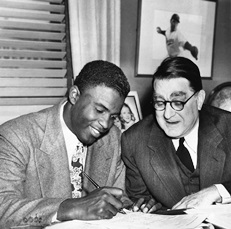
1947– Brooklyn Dodgers president Branch Rickey announced he had purchased the contract of Jackie Robinson from the Montreal Royals, paving the way for Robinson to become the first black to play in the major leagues.
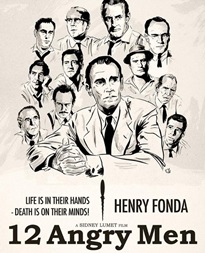
1957– 12 Angry Men, directed by Sidney Lumet and featuring an all-star cast of Henry Fonda, Lee J. Cobb, E.G. Marshall, Jack Warden and Ed Begley, premiered at the Fox Wilshire Theater in Beverly Hills.
The film was nominated for Academy Awards in the categories of Best Director, Best Picture, and Best Writing of Adapted Screenplay. It lost to The Bridge on the River Kwai in all three categories.
12 Angry Men was selected as the second-best courtroom drama ever (behind To Kill A Mockingbird) by the American Film Institute.

1958– Bobby Darin recorded Splish Splash at New York City’s Atlantic Studios.
When the song was released as a single in May, it became Darin’s first hit and the song helped to give him a major boost in his career, reaching #3 on the U.S. pop singles chart and # 2 on the R&B Best Sellers chart.
Songwriter Factoid: It was co-written with DJ Murray the K (Murray Kaufman), who bet Darin he could not write a song that began with the words, “Splish Splash, I was takin’ a bath,” as suggested by Murray’s mother, Jean Kaufman.
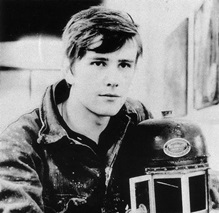
1962– Stuart Sutcliffe, the original bass guitarist for the Beatles, died of a brain hemorrhage at the age of 21.
In July 1961, Sutcliffe – a gifted painter – enrolled in the Hamburg College of Art in Germany but soon began to experience crippling headaches. The cause of the headaches is unknown, although it may have been started by a head injury when he was either kicked in the head, or thrown, head first, against a brick wall during an attack after a performance in January 1961.
Sutcliffe sustained a fractured skull in the fight but refused medical attention at the time and failed to keep an X-ray appointment.
The Beatles’ compilation album Anthology 1, released in 1995, featured previously unreleased recordings from the group’s early years.
Sutcliffe played bass with the Beatles on three songs they recorded in 1960: Hallelujah, I Love Her So, You’ll Be Mine and Cayenne.
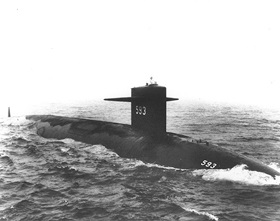
1963– USS Thresher, a nuclear powered submarine, sank 220 miles east of Cape Cod, MA, killing 129 men, including 17 civilians.
While conducting routine underwater safety tests, Thresher lost contact with the submarine rescue ship Skylark after sending garbled communications over underwater telephone indicating ” … minor difficulties, have positive up-angle, attempting to blow,” and then a final even more garbled message that included the number “900” which more than likely signified that Thresher was 900 feet below her test depth of 1,300 feet, meaning the submarine was 2,200 feet below sea level.
When Skylark received no further communication, surface observers gradually realized Thresher had sunk.
A robotic survey showed that the depth Thresher dropped to had caused an implosion and instant – and total – destruction.

1964– The Beach Boys completed the recordings of I Get Around and Little Honda.
The instrumental track for both songs had been recorded eight days earlier, using the “Wrecking Crew” of session musicians.
I Get Around was released as a single in May and became the group’s first #1 song.
That’s A Stretch Factoid: The song was originally credited to Brian Wilson alone until Love v. Wilson, a 1994 lawsuit by Mike Love, amended the song’s copyright to include him as a co-writer.
What did Love contribute to the song? In an interview with Goldmine magazine, he insisted that he and not Wilson came up with the “round round, get around” line.
And for that he received co-writer status?
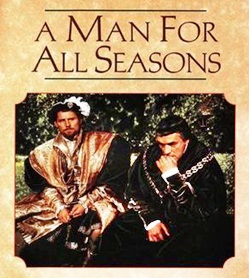
1967– At the 39th Academy Awards, A Man For All Seasons won 6 Oscars.
Among those awards were Best Picture, Best Director (Fred Zinnemann), Best Actor (Paul Scofield), and Best Screenplay (Robert Bolt).
Who’s Afraid of Virginia Woolf? was nominated for 13 Academy Awards and won five, including Best Actress (Elizabeth Taylor ) and Best Supporting Actress (Sandy Dennis).
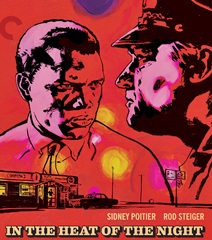
1968– At the 40th Academy Awards, In the Heat of the Night outdueled some serious competition to win the Best Picture Oscar.
The film went up against Bonnie and Clyde, Doctor Dolittle, The Graduate, and Guess Who’s Coming to Dinner.
Rod Steiger (In the Heat of the Night) won for Best Actor in another field filled with incredible star power: Warren Beatty (Bonnie and Clyde), Dustin Hoffman (The Graduate), Paul Newman (Cool Hand Luke) and Spencer Tracy (Guess Who’s Coming to Dinner).
Katherine Hepburn won Best Actress for Guess Who’s Coming to Dinner, with George Kennedy (Cool Hand Luke) winning Best Supporting Actor, and Estelle Parson (Bonnie and Clyde) winning Best Supporting Actress.
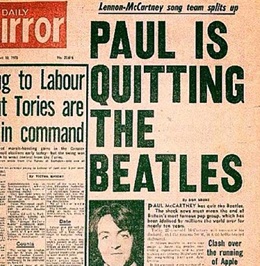
1970– Paul McCartney announced that he had left the Beatles, one week before the UK release of his solo album McCartney.
McCartney issued a printed “self-interview” with advance promotional copies of the solo album. Some of the answers to the interview questions came across to music critics as “petty and self-serving.”
The world may have been shocked but John Lennon, who had kept his much-earlier decision to leave the group quiet for the sake of the others, was furious.
When a reporter called Lennon for a comment on McCartney’s resignation, Lennon said, “Paul hasn’t left. I sacked him.”
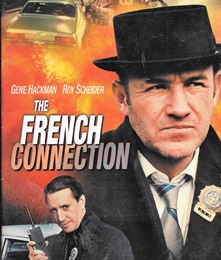
1972– At the 44th Academy Awards, The French Connection was the big winner.
It won three major Oscars; Best Picture, Best Director (William Friedkin), and Best Actor (Gene Hackman).
Jane Fonda (Klute) won Best Actress, while Cloris Leachman and Ben Johnson, both from The Last Picture Show, won Best Supporting Actress and Best Supporting Actor.
Chaplin Factoid: Charlie Chaplin received an honorary award for “the incalculable effect he has had in making motion pictures the art form of this century.”
Chaplin, who had been living in self-imposed exile in Switzerland for twenty years, came back to the United States to re-market his older films and to receive the award.
When introduced to the audience, Chaplin received a twelve-minute standing ovation, the longest in Academy Awards history.
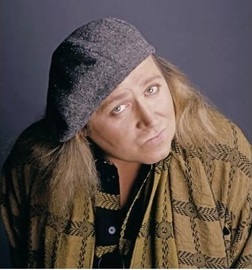
1992– Comedian Sam Kinison, known for his intense, harsh and often politically incorrect humor, died at the age of 38 after his car was struck head-on by a pickup truck driven by 17-year-old Troy Pierson – who had been drinking – about 15 miles northwest of Needles, CA.
According to his brother Sam, who was in the car behind Kinison, the comedian – who had been married just five days prior to the accident – stumbled from his car and collapsed, asking God why he had to die, and why now.
“Okay,” he finally whispered. “Okay … okay.”
Pierson pled guilty to one count of vehicular manslaughter with gross negligence. He was sentenced to one year of probation and 300 hours of community service, and his driver’s license was suspended for two years.
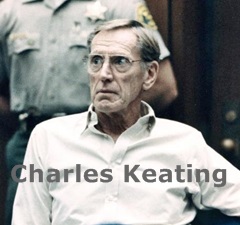
1992– A California Superior Court judge sentenced Charles H. Keating Jr. to 10 years in prison for duping depositors at the Lincoln Savings and Loan Association into purchasing high-risk junk bonds issued by Lincoln’s parent company.
The institution’s failure, which was not directly linked to the bond sales, would ultimately cost taxpayers $2.6 billion.
In sentencing Keating, the judge showed his dramatic flair by alluding to a lyric by folk singer Woody Guthrie. “More people have suffered from the point of a fountain pen than from a gun.”
In April 1996, the 9th U.S. Circuit Court of Appeals in San Francisco ruled the judge had given the jury faulty instructions about the law regarding fraud. The conviction was overturned and Keating was freed after serving over 4 years.
The name of that judge? None other than Lance A. Ito, the presiding judge in the O.J. Simpson double murder trial. He made a few mistakes in that trial, too.
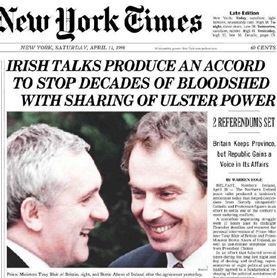
1998– Negotiators in Northern Ireland reached a landmark settlement that called for Protestants and Catholics to share power.
The Good Friday Agreement ended most of the violence of “The Troubles”, a political conflict in Northern Ireland that had been ongoing since the 1960s. It also served as a major development in the Northern Ireland peace process of the 1990s.
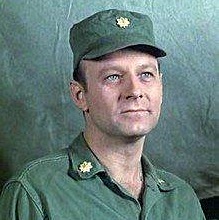
2000– Actor Larry Linville, best known for his role as the inept Major Frank Burns on M*A*S*H, died from complications after cancer surgery. He was 60.

2003– Singer Little Eva died of cervical cancer at the age of 59.
She was best known for her 1962 #1 song The Loco-Motion, written by Carole King and Gerry Goffin and intended for singer Dee Dee Sharp, who passed on recording it.
That created an opportunity for Boyd, who had recorded the demo version of the song. Her version was released, and her stage name was changed to Little Eva.
Her follow-up singles, Keep Your Hands Off My Baby reached #12 on the Billboard Hot 100 in 1962, and Let’s Turkey Trot peaked at #20 in 1963.
By the middle of 1963, her subsequent singles were failing to chart. She continued to tour and record throughout the sixties, but her commercial potential was over.
The Music Industry Isn’t Always Fair: At the high point in her career, Boyd’s weekly salary was $50 plus expenses.
When she quit the music business in 1971, she returned home to North Carolina a penniless single parent of three young children. She found employment as a housekeeper, caretaker and cook.
Compiled by Ray Lemire ©2020 RayLemire.com / Streamingoldies.com. All Rights Reserved.
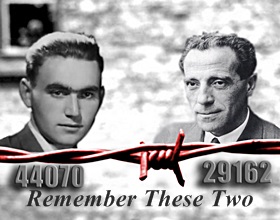
Those are some incredible stats on this eruption! I didn’t know there is a Volcanic Explosivity Index but it makes sense; No. 9 is full of heart; I’m a big fan of ASPCA, though their commercials are heart-wrenching. I didn’t know they were founded way back then!; The fateful voyage begins…very interesting clip with real footage!; Nice try though, Hindenburg (any relation to the airship?); Now there are two true heroes in every sense of the word…fascinating and inspirational!; Here comes Jackie!; I love 12 Angry Men and now will plan to see it again! Great clip!; Whenever I hear Splish Splash, I think of Happy Days 🙂 ; Stuart was on his way to fame and fortune, so sad, so young…; Sadly, Thresher was swallowed up by the great and immense ocean 🙁 ; Classic songs recorded on this day and I agree that’s a stretch 🙂 but it is so catchy!; Love the clip from a famous movie and their fancy wardrobes too!; I’m also a big fan of In The Heat of the Night, both the movie and TV series….and yes, powerful competition, indeed!; Bitter Beatles 🙁 ; Wow! What a chase scene!!! And that Factoid is incredible…12 minutes!!!; I never could stand Sam’s loud routines but it is certainly sad how his life ended and how the driver just got a slap on the wrist 🙁 ; Ugh…Judge Ito…he sure knew how to screw up a solid case; Troubles turned to Peace; Loved Major Burns…and everything about M*A*S*H! along with that clip!; RIP Little Eva…you deserved a lot better 🙁 ; A sincere thanks for keeping my brain geared up throughout the week! XOXOXOXO
Thank you, Wendyl. 🙂
The Hindenburg was named for him.
Rudolf and Alfred were two very great men.
12 Angry Men was an intense film. Love it.
Splish Splash reminds me of the same thing!
Mike Love is a jerk. Always was, always will be (but I did like I Get Around).
I enjoyed Sam. He was loud but he made me laugh with his intensity.
Judge Ito was a publicity-crazy excuse for a judge.
By the way, tomorrow will be a 2-fer … abbreviated versions for Saturday and Sunday, with no column on Easter.
STAY SAFE!
XOXOXOXO
Volcanoes have to be terrifying and to have it active for 3 months is unimaginable. So many deaths. And it shrank! I didn’t know that happened but it makes sense.
All of those who fought the Civil War were brave and their belief in the purpose of the war was strong n both sides. That includes the generals.
What an amazing man to have founded such a vital organization, the proof is in how long it has been part of our society…think f the animal lives it has saved.
Loved the video of the Titanic, great music choice. 😉
Obviously the Nazi Party and it’s twisted leader were saying something the German people thought was best for their country, sad to think about, how hatred can become so intense with the right rhetoric.
Thank God for Rudolf & Alfred! Imagine deporting 12,000 people a day and being unaware of what was happening to your own citizens. The world needed this wake up call.
Jackie Robinson was a
Brave man in addition to being a great ball player.
1957 was a year for some outstanding movies.
Interesting how Splish Splash came to be and how such a silly song was surrounded by conspiracy. Money once again…
I never knew there was another bass player with the Beatles. Tragic way to die.
Horrific what happened to the Thresher. Hopefully their deaths were instantaneous too.
More squabbling over lyrics and again silly lyrics.
1967 Oscars were quite divergent.
1968 Academy Awards were chock full of amazing films and actors. Tough choices. I think I liked Guess Who’s Coming to Dinner the most. It had some of my favorite actors who were brilliant.
The Beatles, always surrounded by controversy.
I don’t think anyone really appreciates how hard it was to act in a silent film. Charlie was the best f the best.
So sad about Sam Kinson. His last words gave me goosebumps. Not sure justice was served.
Ito poor excuse for a judge but it does prove they are not infallible.
Peace in Northern Ireland was hard won for sure. Stubborn people those Irish. I can say that as I am one.
Another sad music story, both her career and her death, Little Eva deserved more.
Thanks, Ray. Sorry I am so slow to reply.
Thank you, Donna. 🙂
Once again, there is no need to apologize for being “slow to reply.” When people get the chance to leave a comment, that’s nice but I know how busy life gets. No worries. 🙂
Stay Safe!